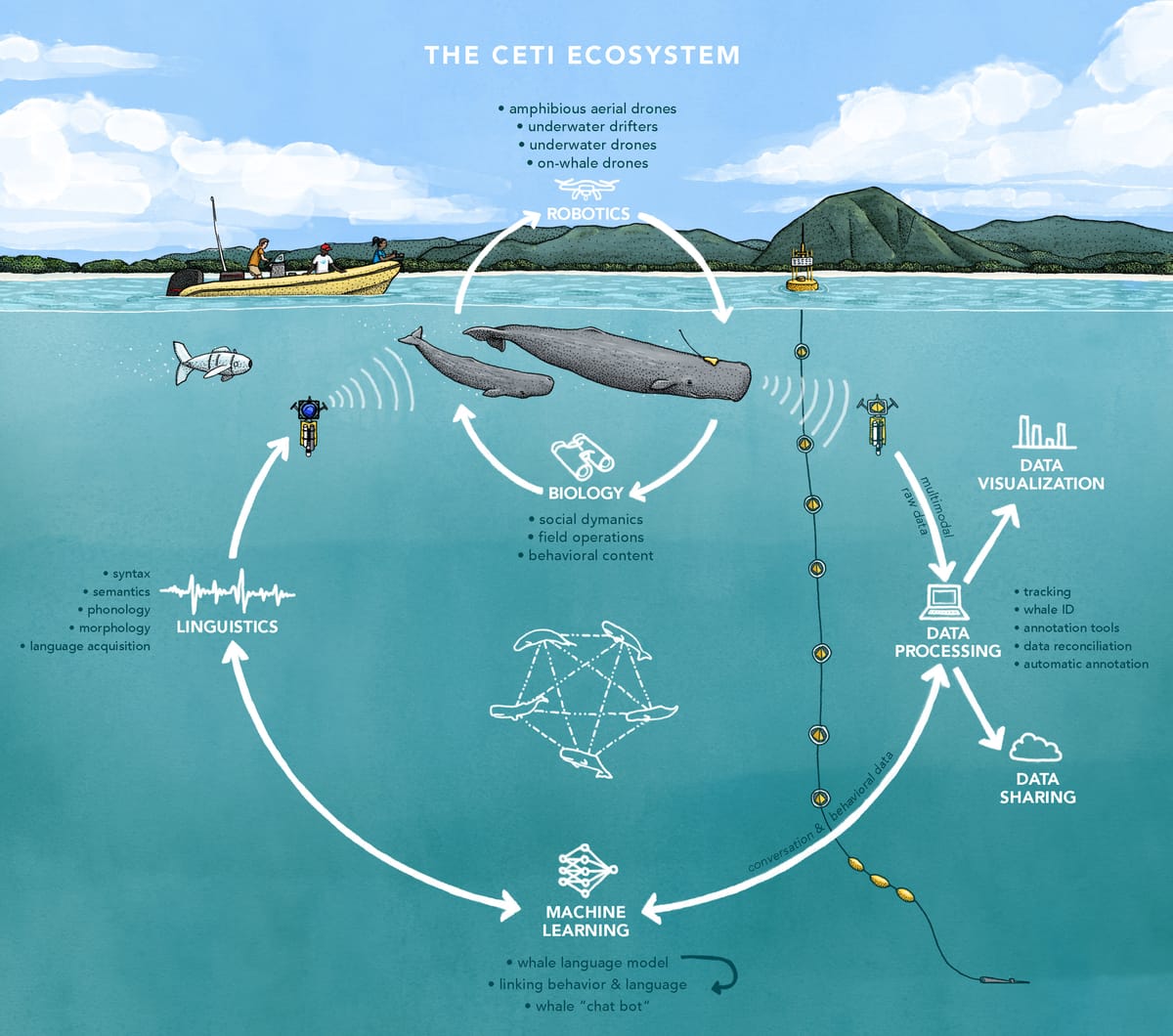AI deciphers whale language
The quest to decipher whale language using artificial intelligence (AI) has seen significant advancements, with researchers employing various AI techniques to understand and potentially communicate with these majestic marine mammals.

The quest to decipher whale language using artificial intelligence (AI) has seen significant advancements, with researchers employing various AI techniques to understand and potentially communicate with these majestic marine mammals. This endeavor spans across multiple projects, each contributing unique insights into the complexity of whale communication, particularly focusing on sperm whales, known for their intricate patterns of clicks and codas.
Project CETI and Earth Species Project
Project CETI (Cetacean Translation Initiative) and the Earth Species Project are at the forefront of using AI to decode animal communication. Project CETI, which received funding from the TED Audacious Prize, is concentrating on sperm whale communication, collecting vast amounts of data to create a large language model (LLM) for whale communication[1]. The Earth Species Project, co-founder of the Interspecies Internet community, employs AI tools to decode and label a variety of animal vocalizations, aiming to understand and even reply to these communications[1].

Sperm Whale Communication: A Complex System
Recent studies have highlighted the complexity of sperm whale vocalizations, revealing a combinatorial communication system. This system, characterized by sequences of clicks known as codas, demonstrates a level of sophistication that suggests the presence of a phonetic alphabet within these vocalizations[3][7][8]. Researchers have identified distinct sequences of clicks, which they believe function as a kind of "alphabet" for sperm whales, allowing them to convey complex information[7][8].
AI and Machine Learning in Whale Research
AI and machine learning are pivotal in analyzing the vast datasets of whale vocalizations. By employing algorithms for pattern recognition and classification, researchers have been able to uncover structured communication among whales, indicating that their communication is not random but depends on the context of their interactions[5]. This approach has led to the identification of distinct vocalizations and the discovery of a more complicated internal structure to whale codas than previously understood[5].

Implications and Future Directions
The use of AI to decipher whale language opens up new possibilities for interspecies communication and conservation efforts. Understanding whale communication can provide insights into their social structures, behaviors, and needs, potentially aiding in the development of more effective conservation strategies[6][9]. Moreover, this research challenges our understanding of communication and intelligence in non-human species, suggesting that sperm whales, and possibly other animals, possess complex communication systems akin to human language[7][8].
In conclusion, the application of AI in decoding whale language represents a groundbreaking effort in the field of animal communication research. By unraveling the complexities of whale vocalizations, researchers are not only expanding our knowledge of these enigmatic creatures but also paving the way for future breakthroughs in interspecies communication and conservation[1][3][5][7][8].
Citations:
[1] https://blog.padi.com/talk-to-whales-with-ai/
[2] https://www.cbc.ca/player/play/audio/1.6985000
[3] https://www.nature.com/articles/s41467-024-47221-8
[4] https://blogs.oregonstate.edu/gemmlab/2024/03/04/from-bytes-to-behaviors-how-ai-is-used-to-study-whales/
[5] https://www.technologyreview.com/2024/05/07/1092127/the-way-whales-communicate-is-closer-to-human-language-than-we-realized/
[6] https://www.nationalgeographic.com/animals/article/scientists-plan-to-use-ai-to-try-to-decode-the-language-of-whales
[7] https://www.washingtonpost.com/science/2024/05/07/sperm-whale-alphabet-clicks/
[8] https://abcnews.go.com/International/sperm-whales-communicate-complex-phonetic-alphabet-study-finds/story?id=110033871
[9] https://www.euronews.com/green/2024/05/08/sperm-whale-communication-could-be-remarkably-close-to-human-languages-scientists-say
[10] https://www.projectceti.org
[11] https://www.npr.org/2024/05/07/1249546255/sperm-whale-communication-ai-language
[12] https://www.earth.com/news/language-like-patterns-decoded-in-sperm-whale-communication/
[13] https://www.nbcnews.com/science/science-news/scientists-document-remarkable-sperm-whale-phonetic-alphabet-rcna151337
[14] https://www.snexplores.org/article/artificial-intelligence-animal-language-technology
[15] https://bigthink.com/life/artificial-intelligence-animal-languages/
[16] https://www.reddit.com/r/technology/comments/18dt7sk/scientists_have_reported_a_breakthrough_in/
[17] https://www.wired.com/story/use-ai-talk-to-whales-save-life-on-earth/
[18] https://www.scientificamerican.com/article/how-scientists-are-using-ai-to-talk-to-animals/
[19] https://www.linkedin.com/pulse/decoding-animal-languages-role-ai-communication-david-cain-rdzqc
[20] https://news.sky.com/story/artificial-intelligence-being-used-to-decode-sperm-whales-language-as-phonetic-alphabet-is-identified-13131145